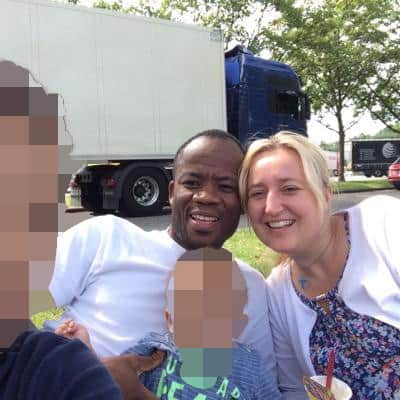Exclusive:A pregnant woman jumped in front of a train – police recorded an illegal abortion


In January 2018, 39-year-old Zdenka Yabani kissed her two children goodbye as they went to school, walked to Slough railway station, and jumped in front of a high-speed train.
She was eight months pregnant. Both she and the unborn foetus were killed.
Advertisement
Hide AdAdvertisement
Hide AdAn inquest later ruled Zdenka, who had bipolar disorder, had intentionally killed herself after being let down by mental health services during her pregnancy, with a coroner identifying failings by several clinicians. Days earlier the mother-of-two had learned there was a risk her baby daughter would be born disfigured and suffering from a genetic abnormality, the inquest heard.
But it seems it wasn’t just the coroner who was passing judgement on the tragedy. The criminal justice system had its own verdict too.
A Freedom of Information (FOI) request has now brought to light how officers from the British Transport Police (BTP) recorded a formal abortion-related offence – and Zdenka as an offender. Charges could not be brought because the suspect was “too ill”, official crime records show.
The detail was inadvertently revealed by the FOI request after NationalWorld asked the force how many crimes it had recorded where female suspects were investigated for ending their own pregnancy. The response said BTP had recorded no relevant offences, but included a note stating that suicides had been excluded.


Advertisement
Hide AdAdvertisement
Hide AdExamination of public Home Office data subsequently showed BTP had recorded one case of ‘child destruction’ under the 1929 Infant Life (Preservation) Act (legislation used to prosecute women who abort their pregnancies, as well as those who assault or kill pregnant women and cause them to lose their babies). The crime was recorded between January and March 2018 – the time of Zdenka’s death – and was the only abortion-related offence the force had recorded since current crime records began in 2014.
BTP has now confirmed to NationalWorld that this was indeed Zdenka’s case. It said officers had been compelled to record an offence under Home Office crime counting rules. The force was unable to say whether her family had been informed, and we have been unable to reach them.
Women’s mental health charity Wish has described the revelation as “deeply troubling”, adding that it “underscores the urgent need for decriminalisation of abortion and highlights the policing of women's bodies”.
“It is essential that law enforcement agencies handle such sensitive situations with empathy and prioritise the mental well-being of individuals involved,” the charity said. “Treating a tragic suicide as a criminal act adds unnecessary distress to the grieving family and fails to address the underlying mental health issues that may have contributed to the woman's actions.”
Advertisement
Hide AdAdvertisement
Hide AdZdenka’s case is an extreme example of what happens when police and prosecutors are left to interpret antiquated laws, and confer legal personhood or victim status on unborn foetuses where lawmakers had never intended it, says Dr Emma Milne. She is an associate professor at the University of Durham who researches the criminal justice systems’ response when a woman is thought to have harmed her foetus or killed her infant. In law, a baby is not a person until it has been born, but abortion-related offences are still classified as “violence against the person” in government crime data.
Demands for the decriminalisation of abortion have mounted this week after a woman was sentenced to 28 months in prison for illegally ending her pregnancy at over 30 weeks gestation. She was prosecuted under an anti-abortion law passed in 1861, but was initially charged with the same offence from 1929 that was recorded in Zdenka’s death. We were present in court, and have published the judge’s full sentencing remarks.
While the 1967 Abortion Act created limited exceptions in which abortions can be performed within 24 weeks (longer when there is a risk of maternal death or foetal abnormality) provided two doctors are satisfied there is a risk to the mental or physical health of the woman, it did not repeal the 1861 or 1929 laws, so terminations outside of this remain a criminal matter.
“We have a very old piece of legislation and the meaning and the purpose of that legislation has been lost over time,” Dr Milne said, speaking about the 1861 Act. “When it first came into force, one of the main drivers for it was actually to try and stop women from dying from abortions. So we're talking about a time when abortion would have been incredibly dangerous.
Advertisement
Hide AdAdvertisement
Hide Ad“So at that time, you can understand why Parliament thought ‘well, we probably need to regulate who can and can't provide abortions because they're quite dangerous’. Now there's a whole debate about who they thought was in the right position to do that.
“It was, of course, men. They didn't think women could make that decision. So there's definitely misogyny laced within the law. But the principles of the law were to protect women from being killed during an abortion. They weren't to criminalise women from making decisions about whether or not they continue a pregnancy.”
The 1929 Infant Life (Preservation) Act meanwhile had not been intended as a means to protect foetal life, Dr Milne went on, but of preventing the killing of a baby while it was actually being born – which could not be prosecuted as murder, as it was not a person in law until fully born.
“They created this criminal offence to kind of fit this gap basically in the law,” she said. “But it's so badly drafted, it can now be interpreted as if you intentionally kill a child capable of being born alive, which can now be interpreted as a viable foetus.
Advertisement
Hide AdAdvertisement
Hide Ad“So again, another example of a really old piece of legislation being used in a way that Parliament did not intend. Parliament needs to step in and look at that law in addition to procuring a miscarriage [the 1861 law].”
The approach to Zdenka’s death bears similarities with a US case, Dr Milne said, in which a woman was imprisoned for murder following an unsuccessful suicide attempt while pregnant, which caused the death of her foetus. While the UK does not have the foetal homicide laws that are present in the US legal system – laws that have now paved the way for ending legal abortions there – our own anti-abortion laws are now being used as a “proxy” for this, Dr Milne said, adding that the UK was in danger of following America’s trajectory.
“I’m really terrified,” she said. “The logical argument is well, if the foetus is a legal person and should be protected under law, why on earth would a woman be allowed to have an abortion at any point? So this trajectory will just devastate women's rights.”
Downing Street has this week confirmed there are no plans to update the law. The Prime Minister’s spokesperson said: “Through the Abortion Act, all women have access to safe abortions on the NHS up to 24 weeks and we have made changes so that now includes taking abortion pills at home. We think this approach provides the right balance and [...] there are no plans to change this.”
Advertisement
Hide AdAdvertisement
Hide AdThe spokesman added: “We recognise that this is a highly emotive issue and obviously we recognise the strength of feeling on all sides.”
If you are struggling with your mental health you can contact Samaritans for free 24/7 by calling 116 123, or emailing them at [email protected],
